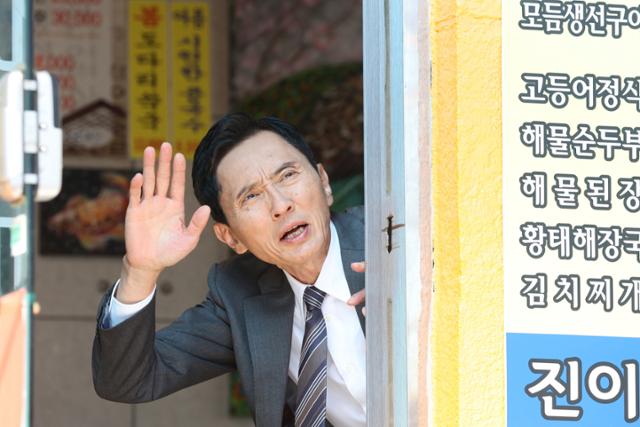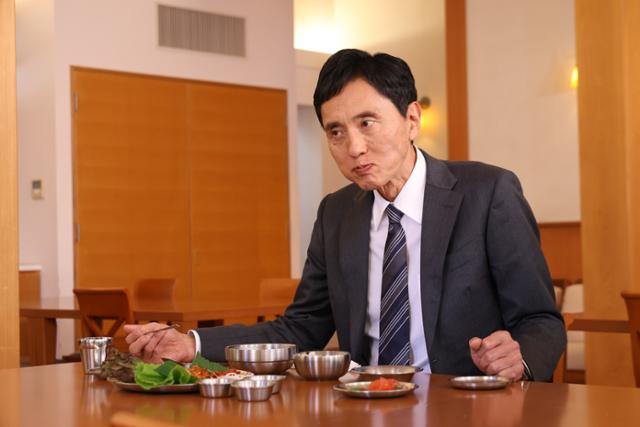
A scene from "The Solitary Gourmet" / Courtesy of Media Castle
The movie version of "The Solitary Gourmet," released March 19, is winning over audiences with its food-filled journey — and nowhere more so than in South Korea, often dubbed the "nation of mukbang." With part of the film set in Korea, the reception has been particularly warm among Korean viewers who have long loved food-centered dramas and variety shows. The film's lead, Yutaka Matsushige, even said, "It feels like young people in Korea love this work more than those in Japan."
The film follows Goro Inogashira (played by Matsushige) as he embarks on a multi-country adventure that begins in Paris, France, travels through a remote island in Japan, visits Nampungdo and Geoje Island in South Korea, and eventually returns to Tokyo. The plot is sparked by an old man's request to taste a childhood soup once again.
Korea plays a key role in Goro's journey. Initially intending to visit a Japanese island, he is accidentally swept into South Korea by a typhoon and lands there illegally. While in Korea, Goro indulges in a range of traditional dishes such as chicken bossam, salted shrimp, stir-fried zucchini, and dried pollack soup. He expresses his envy, saying, "I'm jealous that Koreans get to eat this every day." The film also features Korean actor Yoo Jae-myung, who was personally cast by Matsushige after he saw Yoo's performance in "Voice of Silence."

A scene from "The Solitary Gourmet" / Courtesy of Media Castle
The Korean saying "Koreans are serious about food" rings true, especially given the popularity of food content. Korea has been a trendsetter in the global mukbang phenomenon. In 2021, the word "mukbang" was even added to the Oxford English Dictionary. Numerous TV shows such as "Delicious Guys" and "Please Take Care of My Refrigerator (since 2014)" have contributed to the craze. That enthusiasm has now extended to Japanese shows like "The Solitary Gourmet," which has developed a loyal following in Korea.
Why are Koreans so drawn to food content? Cultural critic Kim Sung-soo points to the deeper meanings embedded in shared meals. "Eating together symbolizes forming a special bond," Kim said. "Even in wartime, when enemies sat across from each other and shared unpoisoned food, it was an act of trust. In our culture, while rice is individually served, side dishes are shared. The table is a communal space, and through shared dishes, we share the results of our labor."
Kim also noted that shows like "When Life Gives You Tangerines" depict scenes where the father catches fish and the mother gathers vegetables — meals are inherently collaborative. "For people from cultures like this, food represents a shared life," he said.
This passion for food content also connects with the sense of deprivation experienced by Korea's younger generation. "In Korea, it's not uncommon for lunch breaks to be skipped," Kim explained. "Many young people are also caught in a cycle of chronic dieting, as appearance has become a highly competitive factor and can yield quick returns. So they can't eat freely. Especially those in their 20s and 30s, living in a hyper-competitive society, seek comfort and vicarious satisfaction through food content. That's why mukbang often comes with the request to ‘eat deliciously'— because many viewers can't eat that way themselves."
Kim added that mukbang content has also evolved. "In the beginning, mukbang focused on massive portions or bizarre foods. But now, the trend is shifting toward enjoying food properly. That's why we've seen a transition from mukbang to cookbang, and even further into cooking competition shows."
A representative from "The Solitary Gourmet" attributed the film's popularity in Korea to this cultural trend. "I think it's been influenced by the ongoing mukbang wave," they told the Hankook Ilbo. "Cooking competition programs have already gained huge popularity among younger audiences, and that flow naturally led to interest in the movie. It's also different from other food content because it focuses not only on eating, but also the emotions and flavors, which adds a healing element for viewers."
They added, "Although it's a foreign production, it's a series with an over 13-year history. That longevity and originality are among the reasons it resonates so strongly with Korean audiences."
Fueled by Korea's deep-rooted love for food content, "The Solitary Gourmet" is expected to continue drawing crowds at the box office.
This article from the Hankook Ilbo, the sister publication of The Korea Times, is translated by a generative AI system and edited by The Korea Times.
 Subscribe
Subscribe E-Paper
E-Paper